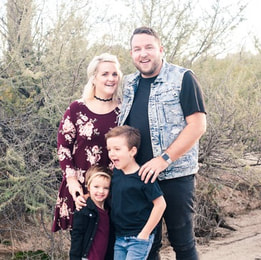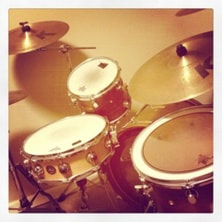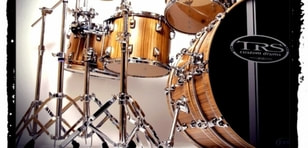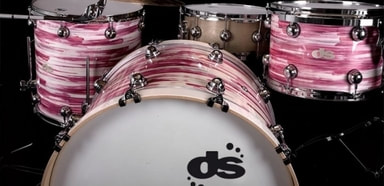 Zach Meade teaches drum lessons in Queen Creek, Arizona and is opening up his books to the mesa area. He is an instructor that specializes in beginning and intermediate drum lessons. Zach is passionate about music and helping students attain their goals and musical aspirations Whether you are a beginning student wanting to learn how to play the instrument, a student preparing for school band, or a drummer trying to learn more technical skill on the kit, Zach is the right teacher for you. He received his B.A. in Music Performance from Whitworth University in 2009. He teaches all styles of drumming and percussion. Zach is a family man who works great with kids. Check out the lessons tab above to learn more about lessons in the Mesa area.
1 Comment
 There are two parts to becoming a career musician; music theory/knowledge and having a good ear. Both parts are equally important and both parts need to be developed in order to become a well rounded musician. Having one without the other will just leave you unbalanced and unprepared. Music theory prepares you to read music and know why it is you do what you do on your instrument. Training your ear allows you to quickly recognize parts, progressions, and overall feel for the music you are playing. Is it possible to have a great ear, yet know nothing about music theory or reading music and still make a living as a musician? Or is it possible to know a lot about music theory and reading but have a bad ear and still make a living? I would say "yes" to both questions, but you will be limited to what gigs you can play or what jobs you can take. For example: if you can't read music, it will eliminate most jazz, classical, composition, teaching, and pro studio gigs. By developing both parts of your musicianship it will open the doors to many more opportunities. If you build your knowledge of music/theory you will not only learn to read music but you will learn why you do what you do on your instrument. This in turn opens up the floodgates for creativity. If you want to develop your knowledge of music and theory, take private lessons, take music theory classes at your local college, and read books about it. By developing a good ear you will be quick to recognize parts and progressions on your instrument. You will also build a great feel for music. I often tell my students that "I can teach you to play funk, but I can't teach you to be funky." This comes from having a great ear and feel for funk music. To develop your ear listen to the genre of music you are trying to play (tons of it!), take ear training classes from your local college, transcribe parts, and take private lessons. There is no "get rich quick" formula to becoming a career musician. It is the results of years practicing, studying, listening, and learning both music theory and training your ear. Be encouraged to get out there and start training both parts of your musicianship.  One of the biggest obstacles to overcome as a student, a pro-musician or teacher is the art of finding time to practice the drums. Let me assure you that nine times out of ten its feels like pulling teeth, when its practice time. Without practice we don't improve! We possibly waste time and money on costly books, lessons, or classes. This can be a huge obstacle for some people to overcome. Let me give you four tips to help you move past the drudgery of making yourself practice. Make it fun! As musicians and students of music we all need to be improving—and not just working on the things that we enjoy. We need to work on techniques that stretch us as players. But if we want to see growth in most areas of our practice and musicianship we have to leave time during practice to have fun. If you make 100 percent of your practice time about getting better, then practice time can often feel like a pain. Make sure to leave yourself time to have fun. What do you enjoy playing or grooving on? Play those drums. Spend most of your practice time working on areas to improve on or techniques/songs to work on. Then, reward yourself at the end of practice time by allowing yourself to play things that are just fun. This will keep you motivated and wanting to come back for more. Schedule time. This may seem like a no-brainer, but most people don't physically do this. I'm talking about taking your schedule and writing in times for practice. When those times pop up on your calendar, treat them just like you would any other appointment. When it’s time to practice, it's time to practice. If you don't think you have time in your schedule to practice your instrument, let me ask you this: How much T.V. do you watch in a week? How long are you on Facebook, Pinterest, Twitter, Instagram, YouTube in a week? How many times a week do you play video games or browse the internet? I think you get the point. If you are serious about improving, you will take your practice time seriously as well. Remember, you're going to make it fun also! Who's keeping you accountable? That’s right! Have you ever heard about an accountability partner? If not, you should get one now. This is one of the greatest tips that can lead to huge improvement and lots of practice. A true accountability partner won’t make you feel guilty but motivate you to practice and inspire you to get better. This could be a spouse, friend, or even private lessons teacher. Ask someone to keep you accountable and motivate you to get better. Get Inspired. This is huge for all of us. It’s possibly one of the main reasons we force ourselves to sit down and practice. After going to a clinic or watching a video of our favorite musician, all we want to do is play and get better. So, get out there and get inspired. Go to a show, watch a video of your favorite musician, buy a new album, listen to an old album, go to a clinic, and take a class. Whatever motivates you to practice, do it! And make it a habit. If you follow these four tips I can assure you that you will see a huge payoff in your personal practice time, which in turn, will lead to a huge payoff in your playing, technique, and overall musicianship. This blog was featured by 'The Black Page' an online drum magazine  As a private instructor I get asked the following question frequently: "How do I choose the right drum set?" Choosing the right drum set is an important task. It’s an expensive and long-term purchase not to be taken lightly. If you are serious about playing and learning the drums, owning a drum set is a crucial tool to have. Making sure you choose the correct kit can be a daunting task. Here are six tips to making sure you choose the right drum set. Price Price will determine the type and quality of drum kit that you can buy. If you are working on a tight budget finding a used drum set could be a good option. When you buy used you can usually find nicer drums for a cheaper price. Check places like Craigslist for used gear. Style Matters Consider what style of music you are interested in and will most often play. Every style of music has a signature drum sound. For instance, jazz drummers tend to have drums with higher tones; rock drummers tend to have drums that produce lower tones with more punch to help fill out the big "rock band" feel. If you want to play all styles of music then maple drums might be a good option since they are somewhere in the middle of the tone spectrum of drums. Wood The type of wood that a drum set is made of affects the tone of the drums. Softer woods produce lower tones with less projection. Harder woods produce higher tones with more projection. There are three main types of wood that most drums are made out of: maple, birch, and mahogany. Mahogany is the softest of the three and will produce lower tones and has a great bottom-end punch. Maple is somewhere in the middle, and tends to be the most popular. Birch is the hardest wood of the three and produces a higher tone with a lot of projection. A lot of cheaper drums are made out of poplar—the least desirable wood for drums since it is basically particle board. Size Does Matter The size of the drums will affect the pitch. A 16" drum will have a much lower pitch than a 10" drum. Think through what style of music you most play, this can help determine what size drums you buy. Rock drummers may want larger drums that produce lower pitch, and jazz drummers may want to buy smaller drums with a higher pitch. Another consideration is the size of the player. I'm often asked, "If my son/daughter is too small for a “normal-sized” drum set, what type of drums should I get?" A great question. What I normally recommend is the Gretsch Catalina Club drum set. It is a smaller drum set that will fit a smaller player—but still is a great long-term purchase. I would avoid the "Walmart special" drums, unless you suspect that playing the drums is a phase that will pass. Location One large factor to consider when choosing drums is the venue that the drums will be most utilized. Is your drum kit going to be most played in an apartment, house, church, arena, or small club? You might want to avoid the Neil Peart extra-big-and-loud drums if you’re going to mainly play your drums in an apartment. A smaller and less projected kit would be a good consideration for smaller venues. An electric kit is a good option for those who live in apartments and want to practice late hours in the night. Sound The last and most important tip is to use your ears. Which drums sound good to you? This is a long-term investment and you want to love the drums you get. Play the drums that you are interested in and decide if you like the sound. This blog was featured on 'The Black Page' an online drum magazine  Teaching ages 5-9 is not impossible, in fact it can be very fun and rewarding. As a private instructor, if you eliminate teaching these ages you are missing out on a large market of students. Here are five great tips that will help you learn to teach these ages: 1. Make it fun Kids at this age are very easily distracted and can have a hard time staying focused on one thing for too long. Try to find ways to make your lessons fun for these students. Play musical games on the instrument, use books with cartoons, ect... Stay positive and keep encouraging even the littlest of accomplishments. 2. Choose the right material There are very few books out there for kids of this age, but be sure to avoid any material you would give Junior or Senior High students. Younger students learn at a much slower pace and can only learn so much at once. Find material with large print and cartoon characters that will keep the student entertained and focused. For drummers I would recommend the book "drum lessons for kids of all ages" 3. Keep it simple Don't try to get to complex with any lesson that your teach. If you are teaching them basic technique give them 2-3 tips and know that it will take them possibly weeks to master. Teach your lessons in their simplest form, or just follow along with the kids material that you purchase and try to be sensitive to your students learning style. Modify if needed. 4. Get parents involved Keep the parents in the loop with how the student in doing/progressing. A good idea would be to keep a lesson journal for you and the student/parent to chart progress. At this age kids won't practice without the parent constantly encouraging them. So, keeping the parents informed about what you are working on and what the student can practice is key to a students success. 5. Be patient One of the most important parts of teaching this age is to be very patient. Young kids learn very slow and need a lot of encouragement. If the student doesn't understand the material right away, be OK with that. They won't progress like an eager high school student will, most of the time. Slow and steady wins the race! |
AuthorZach Meade has been teaching drum lessons for 15 years. He received his B.A. in Music performance in 2005. He has had 2 of his blogs published on the blackpage.net (an online drum magazine) |
 RSS Feed
RSS Feed
